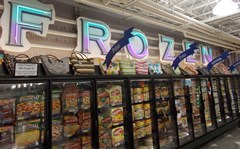By: Stephanie Barnes, Regulatory Counsel, Food Marketing Institute 
The Environmental Protection Agency (EPA) recently proposed changes that would affect refrigeration systems throughout the grocery store, which could create unnecessary disruptions to store operations and impose costly equipment changes. The proposed rule changes the listing of several hydrofluorocarbons (HFCs) from approved to unapproved, some of which are commonly used in commercial refrigeration equipment. The rule also proposes changes to stand-alone self-contained cases, commonly used for soup and salad bars and check-lane beverage coolers, among other uses.
At FMI’s recent Energy and Store Development Conference, Drusilla Hufford, director of stratospheric protection division of the EPA, stated the proposal is part of the agency’s effort to lower greenhouse gas emissions. During the past few years, there has been a trend toward lower greenhouse gas emissions refrigerants across industries. The proposed rule, in particular, will impact food retailers as they work to comply with the change. The proposed changes would take effect in January of 2016.
FMI recently submitted comments on EPA’s proposed rule to highlight the significant impact it would have on food retailers and wholesalers. Of particular interest to FMI and the food retail industry is the proposal to change the listing of R-404A, R-507 and R-422D from acceptable to unacceptable for new and retrofit retail food refrigeration systems. Our comments seek clarification on terms like “new” and “retrofit” equipment and suggest longer implementation time for items that may have supply chain complications or carry a heavy cost, such as stand-alone self-contained cases and foam panels.
Click here to view FMI’s comments and learn more.


 Industry Topics address your specific area of expertise with resources, reports, events and more.
Industry Topics address your specific area of expertise with resources, reports, events and more.
 Our Research covers consumer behavior and retail operation benchmarks so you can make informed business decisions.
Our Research covers consumer behavior and retail operation benchmarks so you can make informed business decisions.
 Events and Education including online and in-person help you advance your food retail career.
Events and Education including online and in-person help you advance your food retail career.
 Food Safety training, resources and guidance that help you create a company food safety culture.
Food Safety training, resources and guidance that help you create a company food safety culture.
 Government Affairs work — federal and state — on the latest food industry policy, regulatory and legislative issues.
Government Affairs work — federal and state — on the latest food industry policy, regulatory and legislative issues.
 Get Involved. From industry awards to newsletters and committees, these resources help you take advantage of your membership.
Get Involved. From industry awards to newsletters and committees, these resources help you take advantage of your membership.
 Best practices, guidance documents, infographics, signage and more for the food industry on the COVID-19 pandemic.
Best practices, guidance documents, infographics, signage and more for the food industry on the COVID-19 pandemic.
